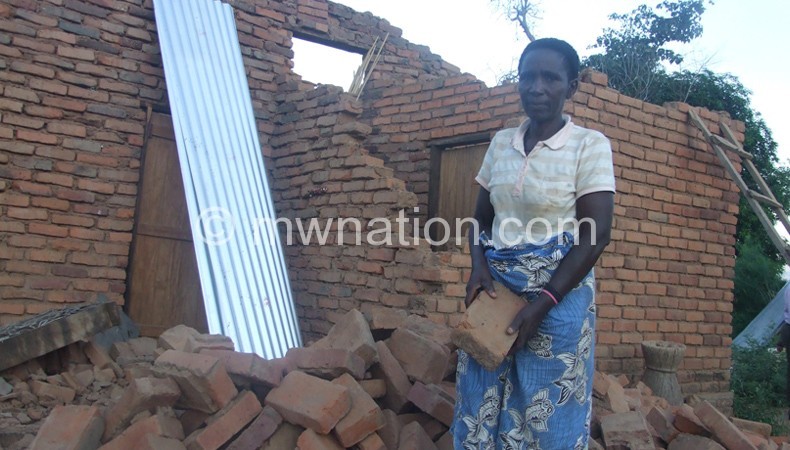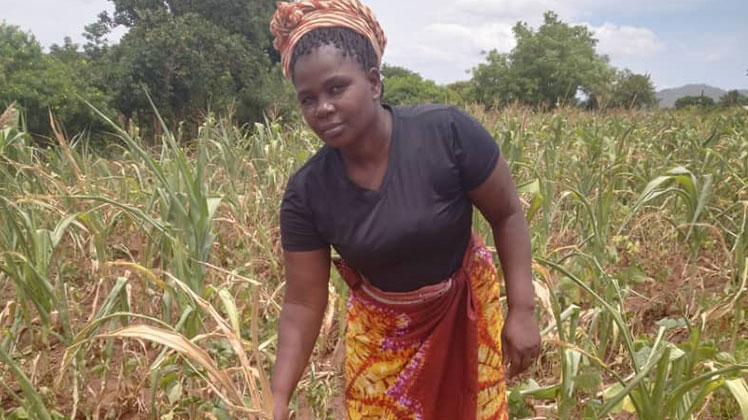Mwaulambo communities speak on coal
In Karonga, Mwaulambo residents liken the unsettling effects of mining to earthquakes that affected nearly 25 000 households in 2009. Mesiya Village, where Mailesi Ngosi lived on the edge of a gaping pit with grinding excavators and other heavy machines crashing into seams of coals, wakes up to tremors reminiscent of the disaster which hit the village too.
“When mining begins, the whole village trembles,” says Ngosi, cursing the day she learnt the village was sitting on coal seams.

She was a queen once. Until the death of her husband—former Group Village Head (GVH) Mesiya—in 2010. The family had a brick house roofed with iron sheets, a symbol of wealth surrounded by fertile fields of cassava, maize and groundnuts. This was the land of his ancestors, a heritage for their children and future generations.
The land was our goldmine; the main source of food, money and livelihood. We never thought of selling it, but it was taken away from us at a fee determined by some people without consulting us,” says the mother of four who has become a human face of how laxity in land and mining laws creates room for big companies to disrupt lives of the rural poor.
Not anymore.
On December 17 2013, the widow received K900 000 (about $2 000) in a compensation for the house and crops, a spree which saw 13 households pocketing between K250 000 (about $588) to K3.2 million (about $7 500) each.
“The amount was scarcely adequate considering land belongs to generations. Moreover, those affected were initially promised standard houses,” says the reigning GVH Mesiya.
In August 2014, the widow was seen pulling down her house brick by brick, salvaging the iron sheets and other possessions.
After years of uncertainty and promises, this is a raw deal,” says Ngosi, who has relocated further from the open-cast mine to a bamboo hut on a mosquito-infested spot bordering Ngerenge Rice Scheme where temporary houses are emerging amid concerns about increasing dusty air, smoke, wastes and other by-products of coalmining.
Now, a sandy footpath splits the village into two eras, past and present. But both sides of the divide are united by widespread cries for a fair deal.
“Low compensation and poor relocation plans are just one of the numerous cries. We want government and the investors, Eland Mining, to stop sideling community voices in their operations,” says Edward Mwaipola who lives about 2km from the coalmine and facilitates local’s dialogue against the ruinous effects of mining.
Ngosi’s plight in the face of large-scale investment in the extractive industry offers vivid lessons why government needs to fast-track the re-tabling of the emended Land Act to safeguard its citizens, activists say.
In June 2013, Parliament passed the amendment bill providing for registration and private ownership of all land.
However, the then president, Joyce Banda, referred it back for further consultation to ensure gender equality and guarantee women a say and right to own land.
The lengthening wait for the re-tabling of the Land Bill has left the country at the mercy of the ancient law which says all customary land is owned by the president on behalf of the republic, says ActionAid project coordinator Elyvin Chawinga.
Since 2013, ActionAid and Centre for Environmental Policy Advocacy (Cepa) have been working with local facilitators to entrench responsive governance in the mining sector in Mzimba, Phalombe and Karonga.
“When explorations establish ores worth mining, the locals are supposed to be compensated adequately and to relocate to an area which is equally good or even better. With the current law, those displaced by mining activity are only compensated for the houses, trees, crops and other developments not the land itself. Yet, land is the centrepiece of the livelihood of the majority of Malawians, the rural dwellers,” argues Chawinga.
She envisages registration and private ownership of customary land giving locals say on mining affairs and the liberty to negotiate better deals with multimillion dollar investors.
“Laws must protect citizens’ interests while promoting investment. It is pathetic that government wants more investors in mining while the law reform is going slow. We need to speed up the process to close the gaps in the existing laws,” says Chawinga.
Protecting the citizens and nature are the crux of the ongoing amendment of the Mines and Mineral Act of 1981 which vests all minerals in the hands of the republic, says Minister of Mining Atupele Muluzi.
Government has a duty to safeguard the interest of its citizens while promoting investment in the country,” said Muluzi on January 10 when he travelled to Karonga following spills at Kayelekera Uranium Mine.
But the 1981 law is outdated and it denies Malawians a say on mining issues affecting them, says Cepa programme officer Cynthia Simkonda. Farcically, it makes mining firms only accountable and liable to the minister responsible for mines and environmental affairs, condemning concerned citizens people to whining and suffering in silence.
“The law came into effect way before Malawi became democratic,” says Simkonda. “Then, we used to be told that our gold was in farming. As the country is rising to its mining potential, we need laws and policies that guarantee rights of citizens’ rights and make their voices count right from the beginning of exploration.
“We need fairness in the emerging sector where transparency and accountability are almost non-existent.”
In their new setting, Ngosi’s firstborn, Welsh, concurs: “We need laws that protect the poor from ills of mining.”





